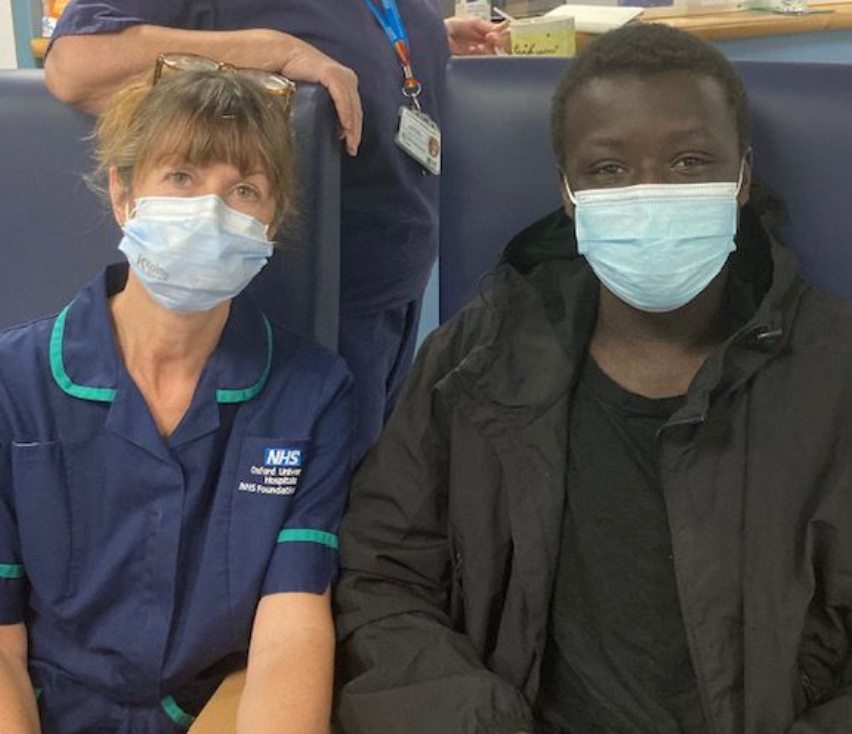
Eczema
Atopic eczema is a very common skin condition which causes skin to be inflamed, dry and itchy. 1 in every 5 children in the UK is affected by eczema at some stage.
What is eczema?
If you’re like many young people with eczema, you may never have been told what eczema is and why it is managed the way it is. It might have been explained to your parents or caregivers, or it may not have been explained to any of you very well.
Many young people feel that they are given endless pots of different creams and have little idea what they should do with them and why.
The more we know about eczema, the more we realise what a complex and variable condition it is.
There are a few simple facts that can really help you understand eczema, so that you can manage your skin better.
What does eczema look like?
Eczema skin is a dry and itchy skin condition. Eczema is a a very variable condition – you and your family will know what your eczema usually looks like, but eczema can have different appearances in different people. And in some people, they can have more than one type of eczema at the same time. To help, we have collected some photos to help show what it can look like at different ages, and in different skin colours.
Often there is scaling and flakiness, and if the eczema is chronic (lasting a long time) the skin can be thicker and you may notice extra lines in the skin. This is called lichenification (lie-ken-if-ick-ay-shen), and is a natural reaction the skin has when it is rubbed or scratched a lot. The thickening helps to protect it from getting broken or scratched deeply. We think the skin is very clever for protecting itself – but it can take a long time for it to return to its normal appearance, and some people don’t like how their skin looks different to their friends.
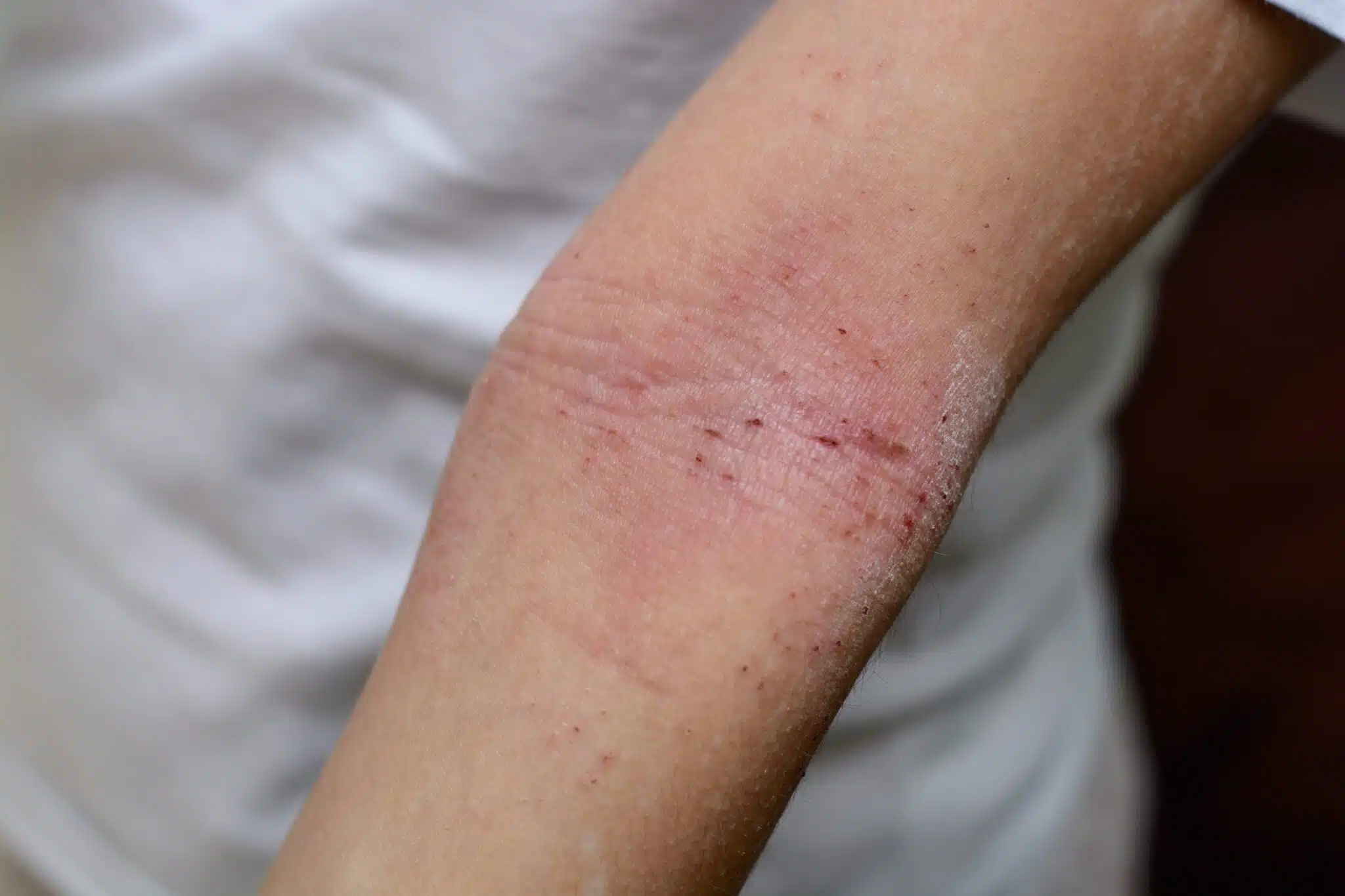
In white skin, you can see the redness clearly, but in skin of colour (darker brown and black skin) it can be very difficult to see the redness. The skin might look darker, or sometimes even a little purple or grey. With a careful eye, your doctor, nurse and you and your family will get to know what signs to look out for in your own skin.
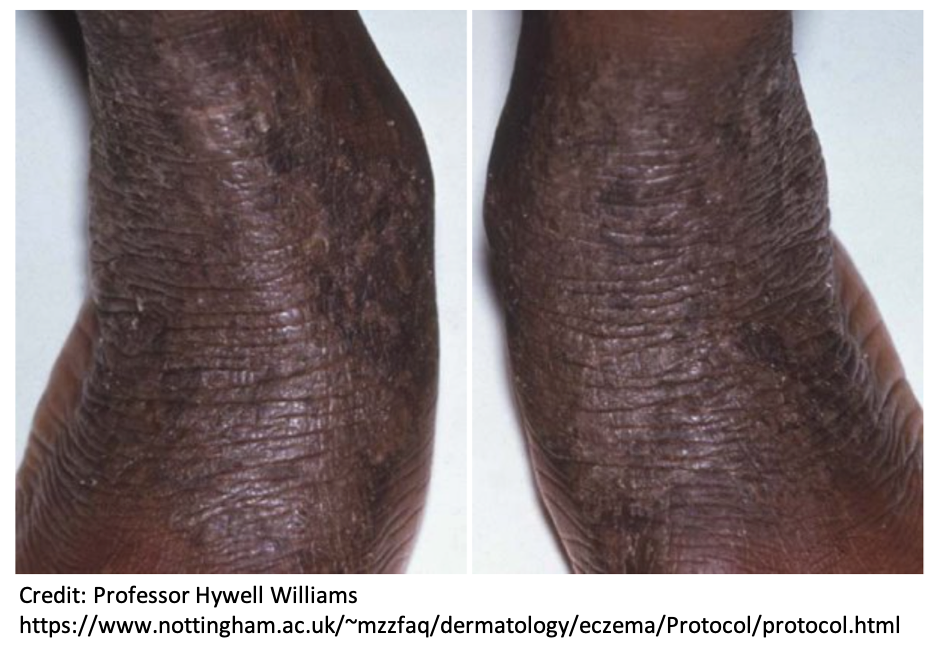
Eczema often affects the face and cheeks in young babies, before appearing in other places as we get older. In many young people, eczema causes patches in the skin creases, for example where your elbow bends, and behind your knees.
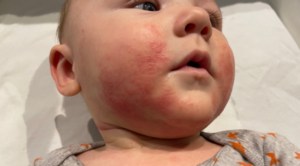
Other than patches, eczema can cause small bumps around hair follicles (this is called follicular eczema and is more common in black skin.) Eczema can also cause raised coin-shaped spots, called discoid eczema. Discoid eczema is often crusty on the surface. On the hands and feet, eczema can cause small, very itchy, fluid-filled blisters. This is called pompholyx (pom-foh-licks) eczema.
Another thing to be aware of is that eczema can cause changes in the colour, or pigmentation, of your skin – either making the skin paler than your normal skin colour (called hypOpigmentation), or darker than normal (hypERpigmentation). The changes in skin colour can be really stubborn and last for weeks or even months after the eczema has faded.
Eczema skin is prone to being crusty or weepy. Sometimes this means there is a skin infection, but other times it is just because the eczema is very active. Often skin infections are painful, and you may feel unwell or notice your eczema spreading to new areas quickly. If you think your eczema is infected, speak to your doctor urgently as you may need to change your creams, or even take some antibiotics.
In some people, eczema can be just on their hands, or face and neck, and in other people it can cover almost all parts of the body. If the eczema is very localised to one area, your doctor or nurse might think whether there is something in your home or school environment making it worse, for example fragrances/perfumes, pets and animal hair, or pollen or dust.
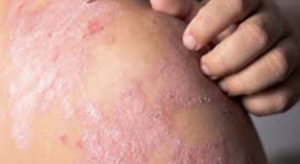
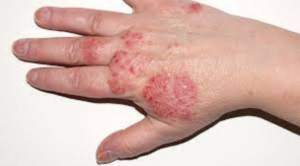
Treatment
Eczema is a chronic, complex condition, and that might sound quite scary. But actually, managing it can be pretty simple. Most patients can get good control by using fairly basic creams and ointments well. Here’s five steps to getting control:
Target dryness
Eczema skin is prone to getting dry. So, help your eczema by avoiding things that can dry out your skin even more. The big one is irritating substances such as fragranced, bubbling products like soaps and shower gels. If it’s really frustrating to cut these out and it’s annoying to be different from your friends, why not experiment? Some people can tolerate some products (you know your skin best!) Be especially careful on the face, though, as this area seems to be more affected in adolescence. Most people with eczema will need to use an emollient or moisturiser to wash with. There are loads of options, so find one you like. Then, use either the same emollient product or a different moisturiser whenever the skin feels dry. Most people don’t need to use this more than once or twice a day. You shouldn’t have to put emollients on constantly. There are so many options so choosing your moisturiser is often a bit of trial-and-error to find the one that suits your skin and your lifestyle/hobbies best. If you are struggling to find one that suits you, speak to your doctor, nurse or your local pharmacist.
Treat inflammation
When skin is itchy, red or sore, use your steroid ointment daily. And here’s the important bit: people often don’t use enough topical steroid, or the steroid they use is too weak. This causes some confusion, even among some health workers. This can mean sometimes people aren’t prescribed enough of the right stuff. The reason it matters is when eczema flares up, it’s like a fire (eczema literally means ‘boiling over’). So, it needs a proper dousing to put it out. Then, it is more likely to stay out and be controlled. Putting very weak steroids on it, or using tiny amounts and rubbing for ages, is like just spitting at a fire. It’s a bit like taking a crumb of paracetamol for a headache rather than the correct dose. It’s certainly safe, but it won’t do much to help.
Keep inflammation under control
When eczema is under control, it doesn’t take much for it to flare back up again. That’s why we recommend treatments to help prevent this happening. This sometimes means treating eczema-prone areas with steroids two days a week, even when the skin is calm (we call this ‘weekend treatment’). You might be asked to keep this going for some months. Then, if there are no flares at all, stop and just keep the topical steroids handy in case the skin flares up again. Steps 2 and 3 are often chunked together and called ‘Get control and keep control.’
If steroid creams and ointments aren’t able to keep your eczema under control, there are other options for treatment including light therapy at the hospital, or tablets and even injection treatment for the most severe eczema. Your doctor and nurse will be able to talk to you more about the other treatment options.
Managing a flare
Find one emollient you like and use it to wash with and to put on dry skin. Find one topical steroid for your face and one for your body. Use it daily when the eczema is bad, for short bursts, and at weekends to control it if needed. For a reminder, check out this poster from nottingham eczema.
Frequently asked questions
Useful links for further reading and support
British Association of Dermatologists - Dupilumab
Eczema Care Online
Eczema for teens pdf
Eczema Outreach Support
Guide for Teenagers with Eczema: Live Your Life
Healthtalk: Eczema
How to Control Your Child’s Eczema
Ichthyosis support group
National Eczema Association
National Eczema Society
Nottingham Support Group for Carers of Children with Eczema - Teenage Eczema - Information for Patients
Oxford University Hospitals NHS Trust - Get control and keep control
Resources recommended by young people (not formally supported by BSPAD)
DJ’s story
I’ve had eczema ever since I gained consciousness at a young age and ever since then it’s been a challenge. My skin would come out in massive flares behind the back of my knees not allowing me to bend my knees. Another time in secondary school I believe I had itched off the skin behind my knees and it had come back again in the morning only to be stuck to my clothes, so somehow my skin and my pajama bottoms were combined. I remember being carried down the stairs by my mother on her back because moving my legs was extremely painful for me.
The hardest things:
I have to check foods to make sure what I was eating wouldn’t flare up my skin, I can’t go out in the sun too long, I have to keep myself at a reasonable temperature, making sure I’m not doing sports because if I did the sweat I produced would make my skin stiff.
Since I’m still somewhat young all these memories of things I wasn’t allowed to do are still fresh, I couldn’t participate in the fun run, sports day etc.
I believe these to be minor but what I wanted the most was to not have eczema and be stricken by things like these.
I would also like to mention bathing, even these days the water has to be hot, it can’t be warm or cold, it has to be hot otherwise when I get out I don’t know how to explain the sensation. I guess it felt tight or dry I guess? Even though it was wet.
Another mention would be clothing – clothing wasn’t one of my biggest problems with eczema but it definitely was one of the most annoying. The wrong materials would pick at my skin as I would walk, so if I picked the wrong material it would pick at my skin all day until I got home from school.
I suppose I also recently discovered the psychological aspects that eczema has on the mind. I just remember being young and crying myself to sleep thinking I was cursed – I was kind of superstitious so I thought I was being punished for something I had done in a previous life. I also thought it had to do with the future too. I do commend those who have the same condition and manage to smile consistently and stay positive, In conclusion, I think a lot of aspects of living are connected to my eczema, of course, I can’t speak for others but this was just a small insight into my experience.
Going to the doctors frequently as well, it wasn’t hard but it was kind of financially demanding on my family, very necessary trips but in the aspect of finances, it was quite detrimental. And school attendance etc, I may have had to miss things just to take care of my health. I also tried not to get in to trouble – I was a bit of a crybaby when I was younger I cried quite frequently and easily in my opinion might still be true to this day but when I would cry, my whole body would feel hot (I don’t know if this is everyone im uneducated in this area) and I would feel the heat all over the body, causing me to itch. The school knew this and thinking back on it now I notice how they took a kinder approach on me for the times I DID get in trouble, which was rare but everyone has their moments!
What has helped the most?
Well the medicine I’m currently on is a big help but i suppose just other things like changing my mindset from what I used to think. So for example previously I would think ”I’m cursed” and a lot of other things along those lines or even worse but now I just try tricks to minimise the thoughts. I don’t really recommend this for anyone else it’s just something that has worked for me, So if it flared up these days I just say ”It could be worse” or ”It is what it is”, if I worried about it constantly I wouldn’t get anything done. So I choose to focus on it when necessary and try to forget it when possible. No matter how long you’ve had it, somewhere at the back of your mind you just acknowledge that it’s there and might not go away, This is what helped me. I kinda chose to go on the path of acceptance and attempted to be unbothered about it.
Did you find talking to the psychologist in the clinic helpful at any time?
I believe I went to the psychologist in the clinic twice, maybe my memory isn’t that good! But yeah I think the younger me found the psychologist to be helpful. I was desperate to feel better so whatever advice I got I took it.
What are your hopes for the future?
Well, a hope of mine would be to have managed and under control conditions living peacefully, I don’t want anything grand I just want to live in a consistent and constant state of peace with my mental, physical and emotional health. Although I would hope that it goes away, I do remember my mother told me my elder brother had eczema for a little while and it disappeared on its own, I would be thankful if a miracle like that happened. But other than that yeah, just peace, managed skin and less doctors visits.
Do you have any concerns about the future?
I do suppose my skin is one of two of my main concerns. I don’t honestly know how I’ll be able to cope if it reverts. The thing is I can say that I’ll do what I’m doing it now and trying to brush it off and try to get it back under control but I’m not gonna know until that time comes, so as rationally as I want to present I don’t know if it’s possible at THAT point in time. All I can hope is that I can handle it.
The thing is I would love to give advice and insight on to how to deal with it but in my eyes I don’t believe I can, I think in the end every person dealing with it will come to their own conclusion of how it was and sure they may be given gems by a few people and ushered to good health by dermatologists. But it’s a culmination of all of these minor + major things that lead to the inevitable outcome of it, the outcome being their story and how they dealt with it. My only hope is that sharing my experience can help you to learn from it.
Get in touch


